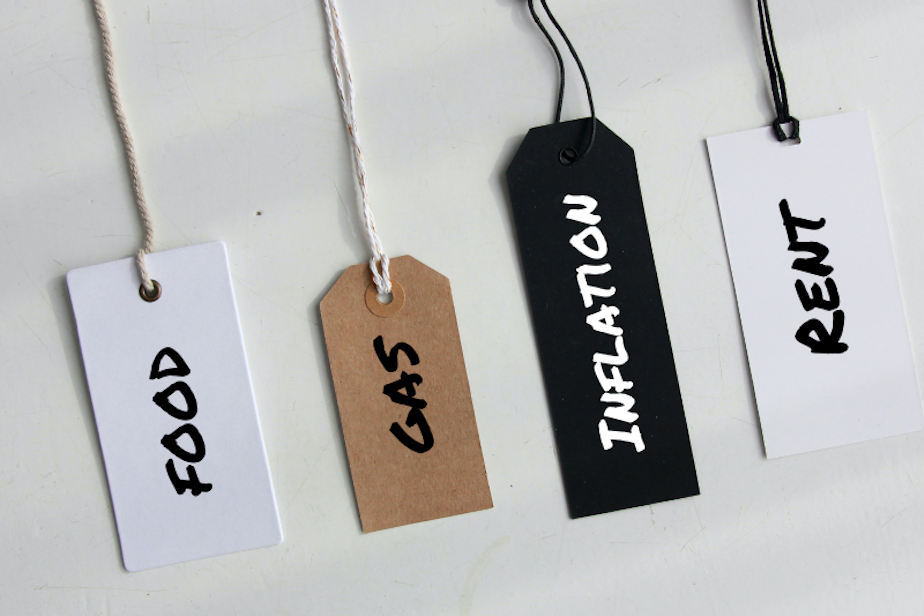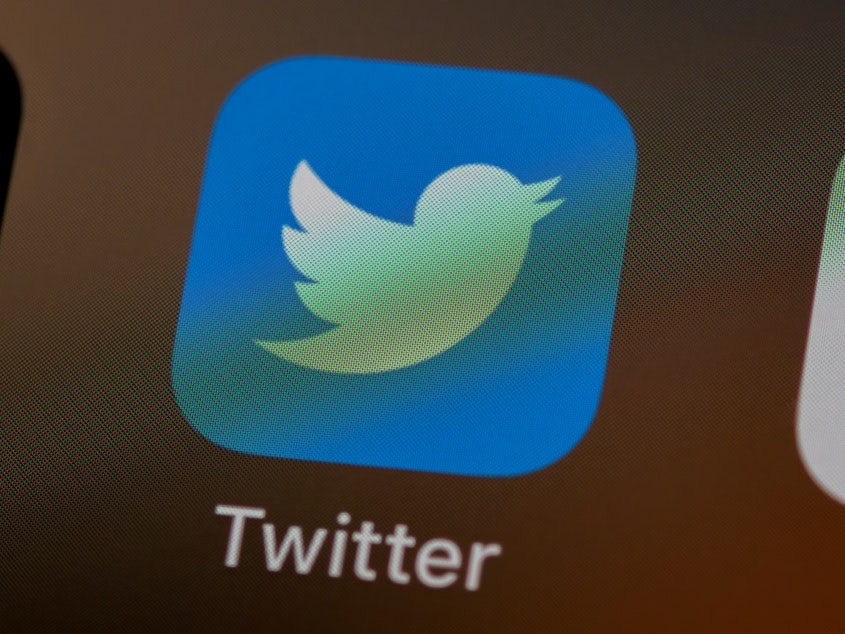Inflation and Seattle's livability gap: Today So Far

- Inflation is easing up across the USA, but it sure doesn't seem like it around Seattle.
- Microsoft is laying off 10,000 employees.
- Washington lawmakers consider bring up the minimum wage for incarcerated people.
This post originally appeared in KUOW's Today So Far newsletter for January 18, 2023.
After informing my friend that I could not afford a quick trip to Seattle, because I had to save money until my next paycheck, she countered that it was free to ride the ferry one way, only $8 bucks for the return trip, and I could just hang out, and not buy any drinks. That sounds like a fun time, huh?
This was years ago, when I was living on Bainbridge Island, barely making ends meet. In fact, I couldn't actually live on Bainbridge. I technically lived just off of it, on a boat. What I didn't tell my friend, at the time, was that I only had about $25 to get through the next week and a half. I was carefully planning meals, and walking to work so I wouldn't put any money into my car. My friend meant well. I was never miffed by anything she said. She just wanted some time out with pals. But she lived in another world that lacked a certain understanding; the sort of world where she would lecture me about spending just a little more to buy organic food, because it is healthier and in the long run, good health would cost less than medical bills due to bad nutrition. An awareness that one organic apple would take a debilitating bite out of the $25 that was getting me through the "here and now" was just not accessible to her. Therefore, there was a gap between how we were living in the same place.
I think of that time when I hear about the impacts of inflation on the Seattle area today. Axios reporter Christine Clarridge told Seattle Now this morning that our region's financial outlook heading into 2023 poses a risk of widening the gap between those making ends meet, and others who struggle to keep up. Some good news is that rent in the region is going down a bit, but the bad news is that it isn't going down fast enough to compensate for how bad rent is in the first place.
Clarridge recently reported that, while inflation is generally going down nationally, the Seattle area is an outlier and "inflation is not cooling as quickly." Food, housing, and energy costs are all up. In fact, food costs are up 11% from a year ago. An easy example is a trip to your local grocery store. Clarridge did just that. Her budget had become accustomed to 88 cent green peppers, but they are now close to $2. Milk prices were about double than she expected. Chicken, eggs, and so on, all up.
"My ordinary grocery bill would be about $90 for the week, for one person. It was twice that yesterday," Clarridge said. "It seems like there was a huge jump. It wasn't in any particular category, it was across the board."
Sponsored
This isn't a Seattle problem, as Clarridge explained to Seattle Now, "This is a world problem," driven largely by supply chain issues and labor shortages. Check out Clarridge's full conversation with Seattle Now here.
Another sign things are getting tight around here, and globally — Microsoft is laying off 10,000 employees. That's about 5% of its total employees. Early reports indicate this will affect about 878 Microsoft workers in the Bellevue, Issaquah, and Redmond areas. In commenting about the move, Microsoft CEO Satya Nadella said that part of this change will be an expansion into AI technology. In a blog post, Nadella also said that the layoffs are partly in response to changing pandemic conditions and the potential of a recession in the coming months.
"We’re living through times of significant change, and as I meet with customers and partners, a few things are clear. First, as we saw customers accelerate their digital spend during the pandemic, we’re now seeing them optimize their digital spend to do more with less. We’re also seeing organizations in every industry and geography exercise caution as some parts of the world are in a recession and other parts are anticipating one. At the same time, the next major wave of computing is being born with advances in AI, as we’re turning the world’s most advanced models into a new computing platform."
Lawmakers in Olympia will consider a proposal this session that would up the pay for incarcerated people in Washington. The bill is being pushed by State Rep. Tarra Simmons (D-Bremerton), who was once incarcerated herself. House Bill 1024 (Real Labor, Real Wages Act) would bring the rate up to Washington's minimum wage of $15.74.
"The 13th Amendment of the United States Constitution abolished slavery and involuntary servitude except for punishment for a crime. So this is often referred to as the 'slavery loophole,'" Simmons told KUOW's Soundside.
Sponsored
Soundside reports that there are about 2,200 inmates employed while incarcerated in Washington state, but they earn far less than the state's minimum wage, often a matter of cents or a couple bucks (despite the state Department of Corrections generating millions through this labor). Simmons argues that if pay is adequate, people would have a better chance upon release. Her bill proposes that the increased pay be put to victim restitution, and things like child care. It also aims to put 50% of the wages into a savings account that will help people after they are released.
"Had I been able to work while I was incarcerated and able to pay off that debt, I would have had money for housing when I was released," she said. "Instead, I went homeless while I was studying for the law school admission test."
Check out Simmons' full conversation with KUOW here.
AS SEEN ON KUOW

Sponsored
Ed Taylor, vice provost and dean of Undergraduate Academic Affairs at the University of Washington, shakes the Dalai Lama's hand. In an essay for KUOW, Taylor relates a story of his visit to India to a popular quote by Martin Luther King Jr., providing a lesson that we are all connected. (Courtesy of Ed Taylor)
DID YOU KNOW?
"Polycrisis," "zero-dose children," and "poverty." Those are words you may, or may not be familiar with. Either way, they are three out of nine words that NPR thinks you should know heading into 2023. NPR predicts they will be hot topics, or just commonly used, in news over the coming year.
So what is a "polycrisis?" NPR reports, "The simplest description of polycrisis might be that all of our old problems are occurring in a new way." That's the simple version. NPR then goes on to describe it in a very NPR way, which is not so simple. In short, it's all the same old crises we've known for generations, happening a lot more often. In 2023, however, this issue will be exacerbated by how connected the world is. So something bad happens in China, and shock waves are felt across the globe, and we all feel a polycrisis.
"Poverty" is probably a word you know, but NPR's guide to popular 2023 words predicts that it will be used a lot as the world continues to recover from the pandemic. A lot of people were pushed into poverty, and ongoing food and fuel issues will help keep this problem going.
Sponsored
"Zero-dose children" is not just a good lesson on how to write a compound modifier, it's another issue that is emerging after a couple pandemic years. With so many folks locked down, a lot of children did not make it into the doctor for routine vaccinations, such as whooping cough or tetanus. Now there are millions of kids running around, estimated to have no routine doses.
Like I said, those are just three of the nine terms predicted to be used a lot over 2023. Check out the full list here.
ALSO ON OUR MINDS

Sponsored
Are you in need of some mid-century modern furniture, industrial kitchen equipment or audio-visual systems? Or looking to brighten up your apartment with a giant neon bird sign? Then you're in luck. Twitter's San Francisco headquarters is auctioning off "surplus corporate office assets" online for a fleeting 27 hours, giving potential lucky bidders the chance to take a piece of the struggling company home with them.

